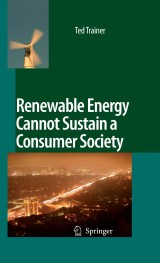Details

Renewable Energy Cannot Sustain a Consumer Society
|
96,29 € |
|
| Verlag: | Springer |
| Format: | |
| Veröffentl.: | 26.07.2007 |
| ISBN/EAN: | 9781402055492 |
| Sprache: | englisch |
| Anzahl Seiten: | 200 |
Dieses eBook enthält ein Wasserzeichen.
Beschreibungen
<P>It is widely assumed that our consumer society can move from using fossil fuels to using renewable energy sources while maintaining the high levels of energy use to which we have become accustomed. This book details the reasons why this almost unquestioned assumption is seriously mistaken.</P>
<P>Chapters on wind, photovoltaic and solar thermal sources argue that these are not able to meet present electricity demands, let alone future demands. Even more impossible will be meeting the demand for liquid fuel. The planet’s capacity to produce biomass is far below what would be required. Chapter 6 explains why it is not likely that there will ever be a hydrogen economy, in view of the difficulties in generating sufficient hydrogen and especially considering the losses and inefficiencies in distributing it. Chapter 9 explains why nuclear energy is not the answer.</P>
<P>The discussion is then extended beyond energy to deal with the ways in which our consumer society is grossly unsustainable and unjust. </P>
<P>Chapters on wind, photovoltaic and solar thermal sources argue that these are not able to meet present electricity demands, let alone future demands. Even more impossible will be meeting the demand for liquid fuel. The planet’s capacity to produce biomass is far below what would be required. Chapter 6 explains why it is not likely that there will ever be a hydrogen economy, in view of the difficulties in generating sufficient hydrogen and especially considering the losses and inefficiencies in distributing it. Chapter 9 explains why nuclear energy is not the answer.</P>
<P>The discussion is then extended beyond energy to deal with the ways in which our consumer society is grossly unsustainable and unjust. </P>
The Context.- Wind Energy.- Solar Thermal Electricity.- Photovoltaic Solar Electricity.- Liquid and Gaseous Fuels Derived from Biomass.- The “Hydrogen Economy”.- Storing Electricity.- Conclusions on the Potential and the Limits.- Why Nuclear Energy is not the Answer.- The Wider Context: Our Sustainability and Justice Predicament.- The Simpler Way.
<P>It is widely assumed that our consumer society can move from using fossil fuels to using renewable energy sources while maintaining the high levels of energy use to which we have become accustomed. This book details the reasons why this almost unquestioned assumption is seriously mistaken.</P>
<P>Chapters on wind, photovoltaic and solar thermal sources argue that these are not able to meet present electricity demands, let alone future demands. Even more impossible will be meeting the demand for liquid fuel. The planet’s capacity to produce biomass is far below what would be required. Chapter 6 explains why it is not likely that there will ever be a hydrogen economy, in view of the difficulties in generating sufficient hydrogen and especially considering the losses and inefficiencies in distributing it. Chapter 9 explains why nuclear energy is not the answer.</P>
<P>The discussion is then extended beyond energy to deal with the ways in which our consumer society is grossly unsustainable and unjust. Its fundamental twin commitments to affluent living standards and economic growth have inevitably generated a range of alarming and accelerating global problems. These can only be solved by a transition to The Simpler Way, a society based more on simpler, self-sufficient and cooperative ways, within a zero-growth economy. The role renewable energy might play in enabling such a society is outlined.</P>
<P>Chapters on wind, photovoltaic and solar thermal sources argue that these are not able to meet present electricity demands, let alone future demands. Even more impossible will be meeting the demand for liquid fuel. The planet’s capacity to produce biomass is far below what would be required. Chapter 6 explains why it is not likely that there will ever be a hydrogen economy, in view of the difficulties in generating sufficient hydrogen and especially considering the losses and inefficiencies in distributing it. Chapter 9 explains why nuclear energy is not the answer.</P>
<P>The discussion is then extended beyond energy to deal with the ways in which our consumer society is grossly unsustainable and unjust. Its fundamental twin commitments to affluent living standards and economic growth have inevitably generated a range of alarming and accelerating global problems. These can only be solved by a transition to The Simpler Way, a society based more on simpler, self-sufficient and cooperative ways, within a zero-growth economy. The role renewable energy might play in enabling such a society is outlined.</P>
Of interest to professionals and lay-readers alike Challenges fundamental assumptions Stimulates the discussion about our common future
<P>It is widely assumed that our consumer society can move from using fossil fuels to using renewable energy sources, while maintaining the high levels of energy use to which we have become accustomed. This book details the reasons why this almost unquestioned assumption is seriously mistaken. Chapters on wind, photovoltaic, and solar thermal sources argue that these are not able to meet present electricity demands, let alone future demands. Coverage also explains why it is not likely that there will ever be a hydrogen economy and why nuclear energy is not the answer. The book, however, does offer an answer: a transition to The Simpler Way, a society based on more simple, self-sufficient and cooperative ways, within a zero-growth economy. It outlines the role renewable energy might play in enabling such a society.</P>
Diese Produkte könnten Sie auch interessieren:

Decision Support Systems for Risk-Based Management of Contaminated Sites

von: Antonio Marcomini, Glenn Walter Suter II, Andrea Critto

96,29 €

Dynamics of Mercury Pollution on Regional and Global Scales

von: Nicola Pirrone, Kathryn R. Mahaffey

149,79 €














